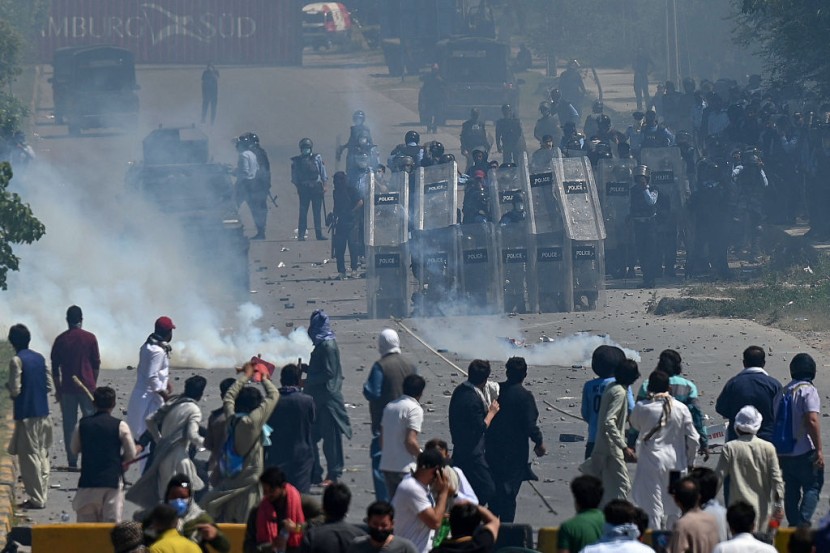
Pakistan's government called out the military in areas of deadly violence following the arrest of former Prime Minister Imran Khan, who was dragged from a courtroom and ordered held for another eight days on new corruption charges that infuriated his supporters and supporters and exacerbated the country's political turmoil.
In an address to the nation, Prime Minister Shahbaz Sharif stated that the unrest caused by Khan's supporters "damaged sensitive public and private property," compelling him to deploy the military in Islamabad, Punjab, and volatile regions of the northwest.
Former PM Imran Khan's Arrest
Following Imran Khan's arrest, audiences in Islamabad and other major cities blocked roads, clashed with police, and set fire to police checkpoints and military facilities, resulting in six deaths and hundreds of arrests. Protesters invaded a radio station in Peshawar, Pakistan's northwest.
Sharif stated that Khan was arrested due to his involvement in corruption and that there was evidence to support these allegations. Khan, deposed by Sharif in a vote of no confidence last year, is detained in an Islamabad police compound.
Per AP News, a judge in a provisional court ordered the detention of the 70-year-old politician for at least another eight days, raising the possibility of further unrest.
Khan's dramatic arrest on Tuesday - he was yanked from a hearing in the High Court of Islamabad on one set of charges, only to be detained on another - was the latest confrontation to roil Pakistan.
He is the seventh former prime minister arrested in a nation that has also witnessed military interventions over the years. In a time of economic crisis, when the cash-strapped nation is attempting to avoid a default, this action is taken.
Khan appeared in Islamabad on multiple corruption allegations filed by police. As he entered the courtroom, dozens of agents from the anti-corruption agency National Accountability Bureau, backed by paramilitary forces, invaded the courtroom. After Khan's guards refused to unlock the entrance, they smashed windows.
Read Also: Tokyo Ginza Robbery: 4 Teens Under Investigation After Suspects Stole Over 100 Rolex in 2 Minutes
Pakistan Protests
Mobile data services were shut down for a second day, along with Twitter, YouTube, and Facebook, as security forces attempted to restore order after violence claimed one person's life late on Tuesday night.
Pakistan is on the verge of civil war - Large and violent protests across Pakistan against Imran Khan’s arrest. Army is out of garrisons in Islamabad. pic.twitter.com/0we80hL6jH
— Ashok (@ashoswai) May 10, 2023
Despite arrests of several top leaders of Imran Khan’s party, protests in Pakistan against Imran Khan’s arrest are becoming bigger and more violent! https://t.co/uuGaOYAXAq
— Ashok (@ashoswai) May 10, 2023
The government stated that supporters of Khan's Pakistan Tehreek-e-Insaf (PTI) party had attacked and damaged state buildings and private and public vehicles. Police reported that 945 of his adherents were detained in Punjab province following the arson of 25 police vehicles and more than 14 government buildings, as per NBC News.
After clashes between Khan's supporters and police, authorities in three of Pakistan's four provinces have banned all public gatherings.
Khan's detention occurred a day after the powerful military reprimanded him for repeatedly accusing a senior military officer of plotting his assassination and the former head of the armed forces of orchestrating his removal from power a year ago.
The Dawn newspaper of Pakistan wrote in an editorial that "the nature and location of the protests that erupted after Khan's arrest yesterday indicate that public fury is also directed at the military."
Khan was scheduled to appear for two proceedings on Wednesday, including a property-related corruption case and a case alleging he illegally sold state gifts during his premiership from 2018 to 22. Khan has denied misconduct.
Per NY Times, a large number of demonstrators pressed through the national Army headquarters' gates. An irate mob set fire to the domicile of a senior military official. Demonstrators are plundering a paramilitary force-run school.
Since its founding 75 years ago, the military has maintained a firm grip on its politics and foreign policy, executing three successful coups and directly governing the country for decades.
Even under civilian administrations, military commanders have maintained an iron grip on power, installing politicians they favored and expelling those who disobeyed orders. Few ventured to defy authority openly.
When legislators and other civilians complained, it was almost always in code, referring obliquely to "the establishment" or "the sacred cow" instead of naming the country's military or its formidable Inter-Services Intelligence agency. They knew what could occur if they continued: disappearances, arrests, and exile.
Related Article : French Journalist Dies During Rocket Attack in Ukraine
© 2026 HNGN, All rights reserved. Do not reproduce without permission.








